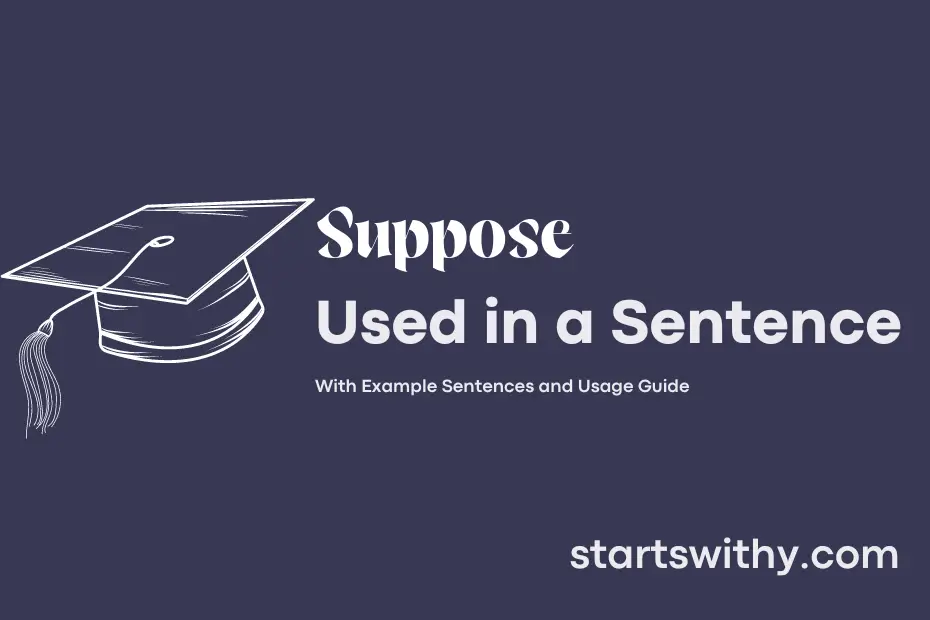Do you ever find yourself wondering how to use the word “suppose” correctly in a sentence? “Suppose” is a versatile verb that is often used to express hypothetical situations, assumptions, or thoughts.
When using “suppose,” you are presenting a scenario or idea that may not be based on reality, asking your audience to consider a situation that may or may not happen. It allows you to explore possibilities and consider different outcomes, making your writing more engaging and thought-provoking.
7 Examples Of Suppose Used In a Sentence For Kids
- Suppose I give you ten chocolates, how happy would you be?
- Can you suppose a world where animals can talk like humans?
- Suppose we all had superpowers, what would you choose to have?
- Suppose you could fly like a bird, where would you go first?
- What do you suppose a rainbow tastes like?
- Suppose we are all superheroes, what would your superhero name be?
- Suppose you could have any pet in the world, what would you choose?
14 Sentences with Suppose Examples
- Suppose you have a group project due next week, what would be the best way to divide the workload among your team members?
- Suppose you need to extend a deadline for an assignment, how should you approach your professor about it?
- Suppose you’re planning to study abroad, what factors would you consider before choosing a country and university?
- Suppose you want to improve your grades, what study techniques would you try implementing?
- Suppose you’re interested in starting a college club, what steps would you take to get it approved by the student council?
- Suppose you’re struggling with a particular subject, what resources on campus would you seek help from?
- Suppose you’re planning a budget for the semester, how would you allocate funds for different expenses?
- Suppose you want to expand your network, what extracurricular activities would you participate in?
- Suppose you’re considering pursuing a postgraduate degree, what steps would you take to prepare for entrance exams?
- Suppose you want to apply for an internship, how would you tailor your resume to stand out among other applicants?
- Suppose you’re dealing with procrastination, what strategies would you use to stay motivated and focused?
- Suppose you’re selected for a leadership role in a college club, how would you effectively manage your team members?
- Suppose you want to organize a charity event on campus, what steps would you take to ensure its success?
- Suppose you’re considering joining a student exchange program, what benefits and challenges would you need to weigh before making a decision?
How To Use Suppose in Sentences?
Suppose is a versatile word that can be used in various contexts to convey different meanings.
When using Suppose in a sentence, remember to follow these tips to ensure clarity and accuracy:
-
Suppose is often used at the beginning of a sentence to introduce a hypothetical situation or a premise. For example: “Suppose you were given the opportunity to travel anywhere in the world, where would you go?”
-
Suppose can also be used to express assumption or speculation. For instance: “I suppose he must have forgotten about our meeting.”
-
In some cases, Suppose can be used as a synonym for “imagine” or “consider.” For example: “Suppose you won the lottery, what would you do with the money?”
-
Suppose can also be used to introduce a conditional statement. For instance: “If the weather clears up, suppose we go for a hike this afternoon?”
-
When using Suppose in a sentence, make sure to pay attention to the verb tense and subject-verb agreement to ensure that your sentence is grammatically correct.
Overall, Suppose is a useful word that can help you create hypothetical scenarios, express assumptions, or introduce conditional statements. By following these guidelines, you can effectively incorporate Suppose into your writing to convey your intended meaning clearly.
Conclusion
In conclusion, sentences containing the word “suppose” are often used to express hypothetical situations, assumptions, or suggestions. They are commonly found in everyday conversations, writing, and formal discussions to speculate on what might happen or to present a scenario for consideration. For example, “Suppose it rains on the day of the picnic, what should we do?” or “I suppose she will be late again, as usual.”
The word “suppose” serves as a versatile tool in language, allowing speakers and writers to introduce possibilities, make educated guesses, or prompt further thought. By understanding the nuances of using “suppose” in sentences, individuals can effectively communicate their ideas, explore different outcomes, and engage in meaningful discussions that involve conjecture and contemplation.



